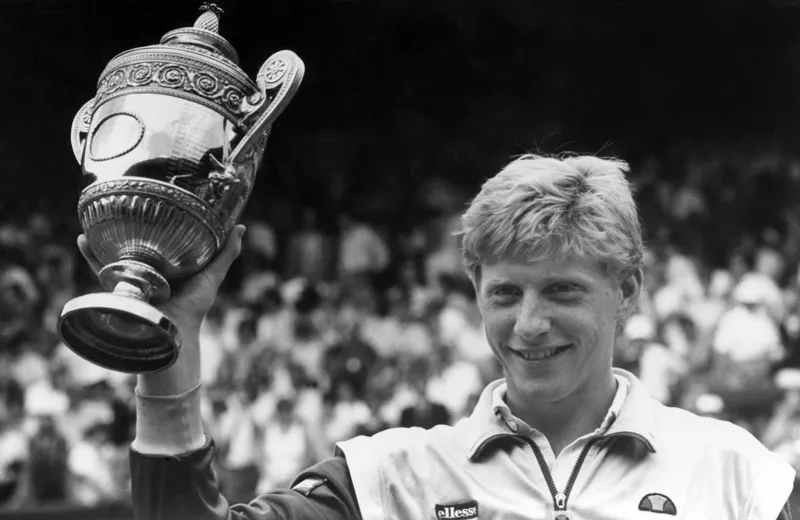Boris Becker is not at Wimbledon this year. But the three-time Wimbledon champion is there in spirit. And some people are not happy about that.
After being on BBC’s Wimbledon commentary team in 2021, Becker is in prison today for bankruptcy fraud. He’s serving a two-and-a-half-year sentence at Huntercombe prison in Oxfordshire, England, about 60 miles from the All England Club.
During the first day of BBC’s Wimbledon coverage for the 2022 tournament, John McEnroe, doing commentary for BBC, said live on the air, “Boris, we love you. We miss you, man.” Sue Barker, a former pro women’s tennis player who’s anchoring the BBC’s Wimbledon coverage for the final time, echoed the remarks: “We do indeed. Well said.”
You might have thought they said, “Cheers, Satan.”
BBC viewers went wild on Twitter. With tons of negative reactions from the public, a controversy was born.
“Any chance of throwing McEnroe off the programme before he sends greetings to Ghislaine Maxwell or Wayne Couzens via licence payers airwaves (shame on Sue Barker also for agreeing). Boris Becker is a convicted criminal!
“Why are your BBC commentators at Wimbledon talking about Boris Becker? The man’s a criminal in jail for committing a crime, so why are they talking about him during the Wimbledon coverage?’
“Has anyone noticed John McEnroe’s talking and missing Boris Becker, a criminal locked up for fraud. What about the victims he knew he was doing wrong. He should be where he is, disgusting.”
“Stop presenters mentioning Boris Becker. We pay taxes in order to buy license fee, he avoids it and it’s rubbed in our face.”
Everyone is entitled to their opinion, and this criticism is part of the cost of fame. Becker, a six-time Grand Slam champion, was jailed April 29 for hiding $2.5 million pounds of his assets with his ex-wives ($3.03 million in U.S. dollars) to avoid paying his debts. He’s had money problems before. In 2002, he was convicted of tax evasion in Germany and got a suspended sentence.
Nobody is condoning any of those actions. The 54-year-old Becker is paying the price and has to repay his debt to society. People want to see remorse from him for being a fraudster.
Empathy Is a Good Thing

Boris Becker was on top of the tennis world in the 1980s and 1990s. BabiP77 / Twitter
Being labeled a remorseless crook is not exactly an ego boost for a former No. 1 tennis player in the world. So is it wrong to wish someone well who’s fallen on hard times, especially if they are a friend?
Becker and McEnroe, a seven-time Grand Slam champion and three-time Wimbledon winner himself, are friends. They competed against each other. They had epic battles. Who could forget their 1987 U.S.-Germany Davis Cup match in Hartford, Connecticut?
It was one of the greatest tennis matches ever. Becker won the five-set, six-hour and 42-minute marathon in front of thousands of rabid American fans and a few hundred German supporters.
Becker was only 20 years old, and already a bona fide legend.
McEnroe could relate to the roller-coaster ride. Johnny Mac was the ultimate “Bad Boy” in tennis. He also was a genius on the court, then evolved into the best broadcaster in tennis. While he’s never been the most empathetic person, he plans to visit Becker in prison and has not lost any respect for the fallen star. On the contrary, McEnroe has compassion for him.
“Boris is a friend of mine. This is just horrible. I want to see him if I possibly can and if he’s willing to see people,” McEnroe said. “I just feel terrible. He’s one of the great players that has ever played the game, and I know it meant a lot to Boris. He’s been going through a lot for a long time.
“He kept telling me, ‘It’s going to be OK, it’s under control.’ You know, that’s Boris. He was just a very confident player on the court. But sometimes you’re not necessarily a great investor, you don’t take care of your money off the court as well. And he’s got a lot going on. And it shows the importance of having good people around you. And it seems like there were some people around him that weren’t helping a whole lot.”
Great Athletes Are Human Too

Three Wimbledon champions. Boris Becker, center, with Novak Djokovic, left, and John McEnroe in 2014. Boris Becker / Facebook
Becker has always respected McEnroe. And after being under the microscope for so many years, Becker learned the pros and cons of being a global icon.
A few years ago, on the BBC’s “Don’t Tell Me the Score” podcast, Becker talked about the challenges of being in the spotlight as a star athlete and famous celebrity, representing his native home of Germany on the world stage as a teenager and young adult.
“I was still very young and felt intimidated by the scale of it, carrying a whole country. What happens if I fail? Have I disappointed all of you? And so expectations got out of hand a little bit. If I lost in the final it was like somebody died and people would criticize you on a personal level. You are walking down the street and big newspapers followed you every step of the way.
“But in those days we had no internet and no social media, I couldn’t imagine what it would be like. It’s so easy to post something on social media without any truth in it and yet you have to prove otherwise. That’s not right. …
“We’re living in strange times, celebrity culture is at an all-time high, but it is not the truth,” he said. “I am a celebrity because I’ve done something unusual but a lot of people are celebrities these days because they are a celebrity. They’ve never done anything in their life that is extraordinary other than being famous.
“So it is very difficult for young children. Do you want to be famous and successful? If so how is it defined? If you have 10 million followers on Twitter, does that mean you are successful? We are living in dangerous times of value and what means what. …
“You always get a seat in a restaurant. You can bend the rules a bit if you’re famous. Some of the old stories haunt me, but I smile about it. For me winning tennis matches was far more important. If someone said 35 years ago that I would have the success I had now, I would sign straight away.”
That was Becker in 2019, at the age of 52. Twenty years earlier, Becker retired from competitive tennis in 1999 at the age of 31. During his career, he won 49 singles, 15 doubles titles and 77 percent of his matches. He also made over $25 million in career earnings.
After his playing days. Becker became involved in various business ventures and worked as a TV commentator. He even coached Novak Djokovic from 2013 to 2016, when Djokovic won six Grand Slam titles.
No one can take away what Becker has accomplished.
Boris Becker Is Not a Bad Guy

Boris Becker, joined by Sue Barker at Wimbledon in 2017, has made a lot of friends in tennis. Boris Becker / Facebook
Boris Becker is one of the greatest players in tennis history. He won Wimbledon for the first time in 1985, at the age of 17 years and 227 days. He was the youngest Wimbledon men’s singles champion ever.
He was unseeded. He became the first unseeded player to win Wimbledon. He was the first German to win Wimbledon. He had a lot of firsts. He was a thunderbolt of a human being. A booming serve-and-volley master. Poised beyond his years. Nothing fazed him.
He repeated as Wimbledon champion the next year, in 1986, and won once more in 1989. He also won the 1989 U.S. Open and two Australian Opens, in 1991 and 1996.
He inspired millions of tennis fans around the world, doing things that had never been done, diving around the court, giving 100 percent for every shot.
He has done a lot of good for the sport.
But life can be humbling and doesn’t always go according to plan. Boris Becker was the king of Wimbledon. No one ever thought he would end up in prison. Seeing him there is heartbreaking for a lot of people. Good people can do bad things. Humanity has a dark side, as the Rolling Stones reminded us with their classic song “Sympathy for the Devil.”
After the song’s release, Keith Richards had an interview with Rolling Stone in 1971 and said something profound, “Before, we were just innocent kids out for a good time, they’re saying, ‘They’re evil, they’re evil.’ Oh, I’m evil, really? So that makes you start thinking about evil. … What is evil? Half of it, I don’t know how many people think of Mick [Jagger] as the devil or as just a good rock performer or what? There are black magicians who think we are acting as unknown agents of Lucifer and others who think we are Lucifer. Everybody’s Lucifer.”
It’s not always easy to be a good human. No one bats 1.000 in life. No one has zero unforced errors or wins every point. Athletes are not saints. They are human, and humans are fallible. If a great athlete makes a mistake, he or she should be held accountable, like anyone else.
Boris Becker won’t be the last legend who sullies their reputation by being human. The punishments should fit the crime, however, and all people should be given opportunities to restore their humanity.
Becker changed the game and will always be a champion. Now he has an opportunity to make a new kind of comeback and change his life.
It’s How You Finish

Boris Becker still has people rooting for him. Robert Dear / AP Photo
A lot of people are still rooting for Boris Becker to learn from his mistakes and be a better human being.
Not everyone has to root for him. But nobody should be criticized because they are.